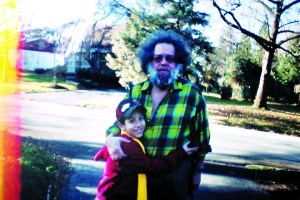
Marshall Berman, the philosopher, writer and professor who wrote the influential modernist text All That Is Solid Melts Into Air, died on Sept. 11 at the age of 72. Mr. Berman had a heart attack while having breakfast with a friend at his favorite haunt, The Metro Diner on 100th Street and Broadway.
Dying over bacon and eggs at the corner diner was a fittingly New York way for a quintessentially New York character to go.
A sizable figure habitually clad in a T-shirt, with unkempt hair and beard and a meandering gait, Mr. Berman was instantly recognizable walking up and down Broadway and West End Avenue.
“It is difficult to imagine anyone more identified with New York or our immediate stretch of the Upper West Side than Marshall Berman,” Jeremy Kalmanofsky, the rabbi at Ansche Chesed, the synagogue Mr. Berman attended for many years, wrote in an email informing the congregation of Mr. Berman’s death.
“He lived life how he wanted,” Michael Kazin, an editor of leftist magazine Dissent, where Mr. Berman served as a board member, told Off the Record. “Marshall was in love with New York and critical of the people who ran it.”
All That Is Solid Melts Into Air, published in 1982, wove together disparate ideas, where Marx, Robert Moses, Goethe’s Faust and Allen Ginsberg’s Howl exemplify the essential paradox at the heart of what Mr. Berman termed modernity.
“To be modern is to find ourselves in an environment that promises us adventure, power, joy, growth, transformation of ourselves and the world—and, at the same time, that threatens to destroy everything we have, everything we know, everything we are,” Mr. Berman wrote in his introduction to the book.
“The book is canonical,” said Todd Gitlin, a Columbia University professor and a longtime friend of Mr. Berman. “It was not only an analytical term but a whole set of feelings.”
The book became a central text that cut across genres and disciplines, as likely to be read by a literature student studying Virginia Woolf as an urban studies major writing about the Cross Bronx Expressway.
“The book’s take on modernity generally and New York’s development in particular helps explain a great deal of what cities get wrong, and occasionally right,” said Errol Louis, a professor and the host of NY1’s Road to City Hall, who first heard Mr. Berman speak as a graduate student in the late 1980s. “It’s on the short list of books I urge students to read to understand the city, alongside The Power Broker, The Death and Life of Great American Cities, Low Life and Invisible Man.”
“It changed the way I felt about cities and streets,” Mr. Gitlin told OTR. “It was a cultural GPS.”
On The Town, Mr. Berman’s 2006 book about Times Square, took on one specific street and examined how the intersection exemplified the vibrancy, sexuality, changing demographics and culture of the city. Taking real and fictional examples as diverse as Al Jolson, Carrie Bradshaw, Benetton billboards, Fleet Week and personal anecdotes, Mr. Berman managed to both intellectualize and memorialize Times Square in smart and accessible prose.
Mr. Berman was in many ways an old-school, new-left public intellectual. In addition to Dissent, he contributed to The Nation, The New York Times Book Review, New Left Review and New Politics. He was a distinguished professor of political science at City College, where he had taught since 1967.
Although some students could be intimidated by him and some didn’t get him, according to Mr. Gitlin, he was generous with both his time and his mind and was a popular professor.
“He read vastly and yet didn’t make you feel like a shmuck or an ignoramus,” Mr. Gitlin said. “He was the opposite of a snob. He believed in being available and putting the life of the mind to use.”
Indeed, his embrace of hip-hop and penchant for casual dress were notable.
“He wore T-shirts everyday, even to the symphony,” Mr. Kazin said.
Even to shul. On Rosh Hashanah, just a week before he died, Mr. Berman wore a peach-colored velvet jacket over his customary T-shirt.
Mr. Berman and his family—he is survived by his wife, Shellie Sclan, and sons, Danny and Eli—were active members of Ansche Chesed. Religious observance may have seemed at odds for a man often identified as a Marxist Humanist.
But then, Mr. Berman embraced many contradictions.

